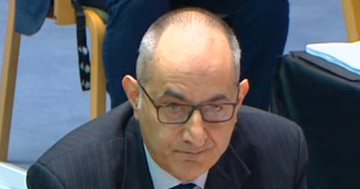Mike Winters* shares tips on how to make sure you’re financially secure before quitting your job.
 As part of what’s been dubbed the Great Resignation, 95 per cent of workers are thinking about quitting their jobs, with a third citing burnout as a primary factor, according to a recent survey.
As part of what’s been dubbed the Great Resignation, 95 per cent of workers are thinking about quitting their jobs, with a third citing burnout as a primary factor, according to a recent survey.
If this describes you, you’ll want to feel financially secure before you jump ship, especially if you aren’t leaving for another job.
Here’s a look at a few must-dos if you’re keen to become financially secure before quitting.
For the sake of financial security, you should ask yourself if you really need to quit in the first place.
In most cases, you likely won’t qualify for unemployment benefits if you quit voluntarily, unless it’s for a “good cause” like unsafe working conditions, or to take a firm job offer that later falls through.
Plus, quitting gives you less flexibility in finding a more desirable job, as you’ll be racing against the clock to mitigate dwindling savings.
If you feel like you can’t tough it out under your current working conditions, talk to your boss about what can be done to shift or lessen your workload — the worst they can do is say no, and if they truly value you as an employee, they might be willing to do what it takes to keep you.
And by staying employed, your job search can last as long as you need it to, allowing you to jump when the right job comes along.
Reduce your fixed expenses
Just because you have money saved up doesn’t mean you necessarily want to spend it, either.
Try to stretch every dollar by revisiting your expenses and reducing how much you spend off the top every month.
As an example, could you save on rent by living with your parents? Do you really need more than one streaming TV service? Can you cut back on your monthly internet, phone and electricity costs?
The best way to do this is to compare your current costs to other providers in your area.
We’ve partnered with a powerful comparison tool called eConnex to help make this process fast and easy.
You can even use your most current electricity bill details to get an accurate comparison.
Since you won’t have any income coming in, you’ll want to keep spending to a minimum.
Make sure your debt is manageable
Reconsider quitting your job until you’ve paid off any high-interest debt from credit card balances or other loans, especially if there’s any chance that you might miss a payment once the regular paychecks stop rolling in.
Otherwise, you’ll want to take stock of your expenses and see how your debt payments can be maintained while you’re unemployed.
It’s important that you feel financially secure, or at least have a way to manage your debt before you quit.
Have six months’ worth of living expenses in the bank (if you can)
It’s a tall order to be sure, but financial planners commonly recommend having at least six months’ worth of living expenses (rent, car, insurance — all of it) lined up before quitting a job, if not more.
Of course, the labour market is thirsty for employees right now, but you should plan for uncertainty, too.
A lot of people leave their jobs with plans to get a new job right away, but that doesn’t always happen, even if you have relevant in-demand experience.
*Mike Winters is a contributor at Life Hacker.
This article first appeared at lifehacker.com.au.











